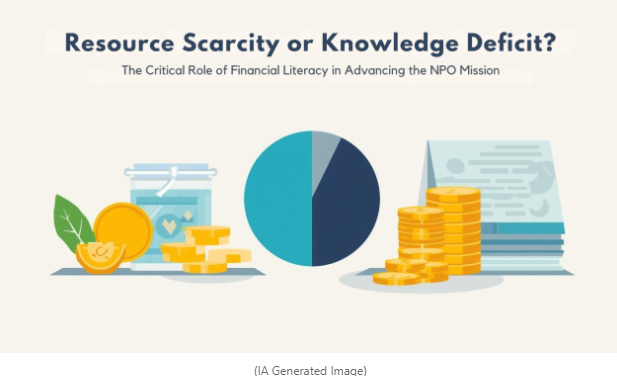Liderança | Empreendedorismo | Gestão | Planeamento | Estratégia | Escrita para Financiamento | Especialista em financiamento para desenvolvimento | Orador internacional
5 de outubro de 2025
A key question for non-profit organisations (NPOs) is whether their difficulties in advancing their missions are primarily due to a lack of resources or to a lack of knowledge about how to mobilise resources. This article examines the decisive role of financial literacy and the democratisation of resource allocation opportunities in empowering NPOs to achieve sustainable impact.
While many NPOs cite resource scarcity as a fundamental challenge, research reveals that the challenge is often rooted in limited access to the right knowledge and strategies, rather than simply the lack of funding itself (Cammack, 2014). Organisations that invest in building internal financial skills are consistently able to diversify their funding sources, navigate competitive environments, and develop resilient resource mobilisation models (U.S. State Department, 2024). As the Consumer Financial Protection Bureau notes, nonprofit organizations make up the largest share of financial education program delivery, spending approximately $670 million per year on financial education nationally (National Financial Educators Council, 2024).
Financial literacy is a central pillar for sustainable non-profit management. It enables organisations to make informed decisions, strategically allocate limited resources, and optimise the impact of every pound or euro received (Lusardi, 2023). Academic research highlights that NGOs with higher financial education levels are more proactive, innovative, and successful at fundraising, partnering, and sustaining donor relationships (GFLEC, 2024).
The involvement of NPOs themselves in delivering financial literacy is also recognised, especially for staff and board members. Organisational leaders benefit from understanding budgeting, financial reporting, auditing, and compliance, which reduces operational risk, improves transparency, and builds trust with stakeholders (Council of Nonprofits, n.d.). Good financial management practices are critical elements of any non-profit organization and demand careful attention in capacity building efforts (Calgary United Way, 2019).
Beyond financial knowledge, there is a strong need to democratise opportunities for resource allocation. Studies indicate that NPOs that practice participatory resource mobilisation—engaging communities, donors, and multi-sector partners—achieve higher stakeholder satisfaction and more effective project outcomes (Terzieva, 2025). Research provides evidence that donor pressure impacts spending decisions, and that managers must balance overhead spending to maintain transparency and trust (AAAHQ, n.d.).
Innovative approaches, such as leveraging networks, building capacity for digital fundraising, and involving beneficiaries in decision-making, can significantly broaden the base of support and foster community ownership. Nonprofit organizations are frequently lauded as essential contributors to a functioning democracy, serving as “schools for democracy” that produce citizens able and ready to participate in society (Nonprofit Quarterly, n.d.; University of Pennsylvania Law Review, n.d.).
Effective resource mobilisation in the non-profit sector is not solely a matter of how much funding is available, but also a matter of how much knowledge NPOs possess about the mechanisms of fundraising, allocation, and financial planning (Ressler, 2021). Investing in organisational financial capacity and democratising access to resource opportunities are paramount for maximising social impact and strengthening democratic participation in civil society.
References:
Calgary United Way. (2019). Capacity building for financial management. Calgary United Way.
Cammack, J. (2014). Building financial management capacity for NGOs and community organizations: A practical guide. Practical Action Publishing.
Council of Nonprofits. (n.d.). Financial literacy for nonprofit boards. National Council of Nonprofits.
Global Financial Literacy Excellence Center. (2024). Nonprofit. George Washington University School of Business.
Lusardi, A. (2023). The importance of financial literacy: Opening a new field. Journal of Economic Perspectives, 37(4), 137–159.
National Financial Educators Council. (2024). Community and nonprofit organizations: Financial literacy programs.
Nonprofit Quarterly. (n.d.). Nonprofits as agents of tension and democracy.
Ressler, R. W. (2021). Nonprofits: A public policy tool for the promotion of subjective well-being. PMC, 8(4), 1-16.
Terzieva, B. (2025). Democracy and management: Organizational practices in nonprofit organizations. SAGE Journals, 54(3), 412-438.
University of Pennsylvania Law Review. (n.d.). The rationale for nonprofit organizations. Journal of Business Law, 167(8), 1728-1756.
U.S. State Department. (2024). NGO financial management capacity building. Bureau of Democracy, Human Rights, and Labor.


